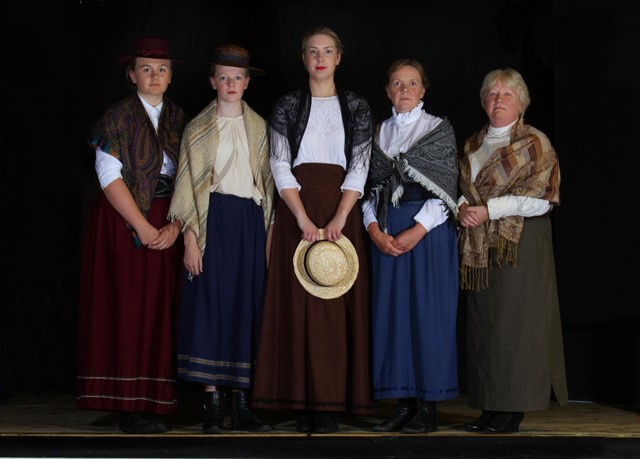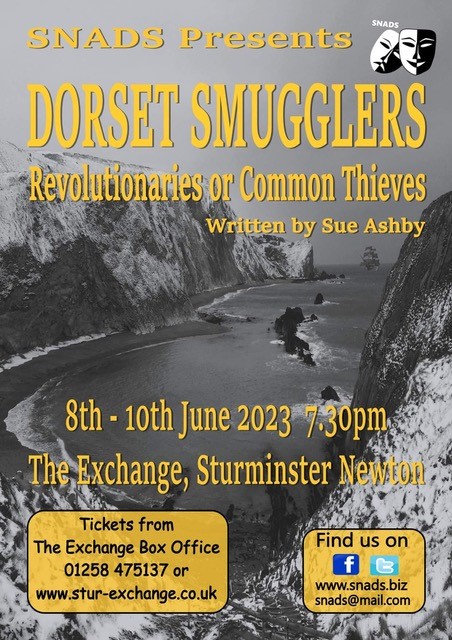Every box in DHC’s repositories is a remnant of a human experience – from farm accounts to heartfelt diaries. So it’s no wonder that writers, including our supporter Minette Walters, find inspiration in the archives and put fingers to keys to retell stories of times long past. Read on to find out how Sue Ashby, a Playwright in Sturminster Newton has been inspired by local history. If you’d like to talk to us about your own writing project or perhaps a visit by your group, do get in touch.
—
Why write historical plays? Well Shakespeare did and, while we are not anywhere near the same league as Will, living in Dorset got myself and Tony Benge penning a handful of historical plays set in the Blackmore Vale.
Mainly it was circumstance. As the centenary of WW1 loomed, Tony and I, professional playwrights who’d cut our teeth on contemporary drama (including soaps), decided to write a community play for Bourton. It was to commemorate the women munitioneers who made 3 million Mills Bombs in the foundry at the end of Bridge Street where we lived.
Funded by the Heritage Lottery, On Them Our Lives Depend played to packed audiences in the village hall in July 2017. The drama followed how women who normally took in laundry or raised young children on tight budgets found their lives transformed – learning engineering skills, founding new friendships and becoming politicised in an era when the issue of women’s suffrage was spreading even in working class rural communities. Local events of the time included the 1917 flood that occurred when the dam at Stourhead Lake burst and badly damaged the foundry leaving Mills Bombs ending up in the Stour at Sturminster Newton.
Our research was aided by visits to The Keep Museum, local newspaper reports and photos of the period which included locals – dressed in Sunday best – gathering at Bourton’s totally destroyed road bridge after the flood. The village school log contained daily records of truants, concerns about the safety of teachers’ sons at the Front and school days when pupils picked fruit to send to a Hampshire jam factory. A descendant of Will Candy gave us the tragic family story of a local soldier, captured by Turks, dying during the march towards Baghdad, and the Somerset Records yielded an account of Bourton’s first lieutenant killed on the Front line in France.
On the strength of this first drama we were asked to write a play to commemorate Peace Day, July 1919 in Sturminster Newton. The play was performed at The Exchange in November 2018 by Taboo Theatre’s local cast. Titled Rage, Tears & Cider it took place over that one historic day of commemoration and celebration and featured the great, the good, the homecoming survivors and the families they’d left behind. There were those grieving for lost sons and the women who kept the home fires burning and the fields cultivated. In charge were council leader Scott Williams unable to show his grief for a lost son, the vicar delivering the roll of honour to those who fought and the police chief ready to quell any dissent from those who had returned from France to find no employment. Among the women were the angry mother whose son was not on the memorial, the farmer’s wife seeing the men who fought rewarded with a lunch at The Swan while the women who kept the land producing were not even given a mention, and one of the Fuller sisters, a pacifist, folk singer and suffragette, who protested alongside them.

A wealth of information was found through the Sturminster Newton History Group, as well as local press cuttings, council minutes and church records held at Dorset History Centre.
A site-specific piece followed in June 2019 performed at Sturminster Mill. We went back in time with The Miller’s Daughter to the 1830’s when the mysterious, mythical Captain Swing was targeting rural communities, urging the impoverished workers to rise up against the industrialisation of agriculture. The miller’s daughter – unbeknown to her parents – gave sanctuary to a young lad from Stour Provost who had escaped arrest after an attempt by a mob to break a machine in East Stour.
The play focused on the extreme poverty of working people, their loss of land to grow food as landowners enclosed their estates, and an almost destitute woman whose children had been imprisoned for picking up twigs under a hedge for the kitchen fire. Even the miller’s livelihood was threatened after two bad summers had produced little wheat. The play culminated with the young lad giving himself up to the dragoons who’d been drafted in to quell unrest, and the miller’s daughter being arrested.
2020 and Covid arrived and for me the sad loss of my husband and long-time writing partner. My grief was somewhat alleviated by another writing commission: a play about the first plague to reach England, which coincidentally arrived in England by boat at the port of Melcombe Regis. On the dockside a flea on a sailor jumps onto the plump neck of a merchant buying luxury goods for his wealthy customers and before long the merchant, his wealthy client and fishing folk along Dorset’s coast are dying of a mysterious illness.
Flea the Pandemic follows the path of the plague as a pedlar – who has come into contact with the merchant – travels from Dorset’s coast through Dorset’s towns and villages to Shaftesbury. Whether he is a carrier of the plague we never find out. But it spreads all the way to Gillingham then north to Wiltshire and west to Somerset, leaving hundreds dead in its wake.
This dark episode of English history was enlivened by the character of Dorset’s Sheriff whose regular briefings in market squares across the county channelled Boris Johnson’s speeches during Covid – in medieval parlance of course. Again it was performed at The Exchange, only after a couple of attempts as Covid kept interrupting our planned dates!

Most recently (2023) I researched and wrote Dorset Smugglers: Revolutionaries or Common Thieves for SNADS who performed it at The Exchange in early June. Like Flea the Pandemic it was an ensemble piece with up to twenty actors. The play follows Isaac Gulliver from his marriage to Elizabeth Beale in 1762 to his death in 1822. From his faithful fellow smuggler Roger Ridout carrying out the runs of contraband on Lulworth beach, their daring grows to execute the rescue of French aristocrats from the guillotine and the theft of the Blue Diamond from the French Crown Jewels.
Finally, for Sturminster Newton’s 2023 Litfest I wrote a short one woman play, From Sturminster Newton to The White House: the Fuller Sisters in America, which followed their five folk singing tours between 1912 and 1917. All of the Fuller family who lived in Bridge Street during WW1 were suffragettes and pacifists, their brother worked for the Peace movement in America during the war. This play – performed at The Exchange – has created an important connection between myself and a folklorist in America that has an important archive of the Fuller sisters WW1 tours in Washington.

None of these plays could have seen the light of day without the support of local people keen to tell us their family’s histories, the local government archives of Dorset and Somerset with their wealth of historical documents particularly The Dorset History Centre, the actors of Bourton Players, Taboo Theatre and SNADS who brought our Dorset history plays to life onstage at The Exchange and Sturminster Mill, and our funders, Heritage Lottery, local businesses and council grants.
History is amazingly brought to life through theatre, a fact evidenced by the large and enthusiastic audiences who have attended each and every performance.
—
This was a guest blog written for Dorset History Centre by Sue Ashby, Playwright. If you would like to promote your local community event, or tell us about some research you have been undertaking, please get in touch: archives@dorsetcouncil.gov.uk

